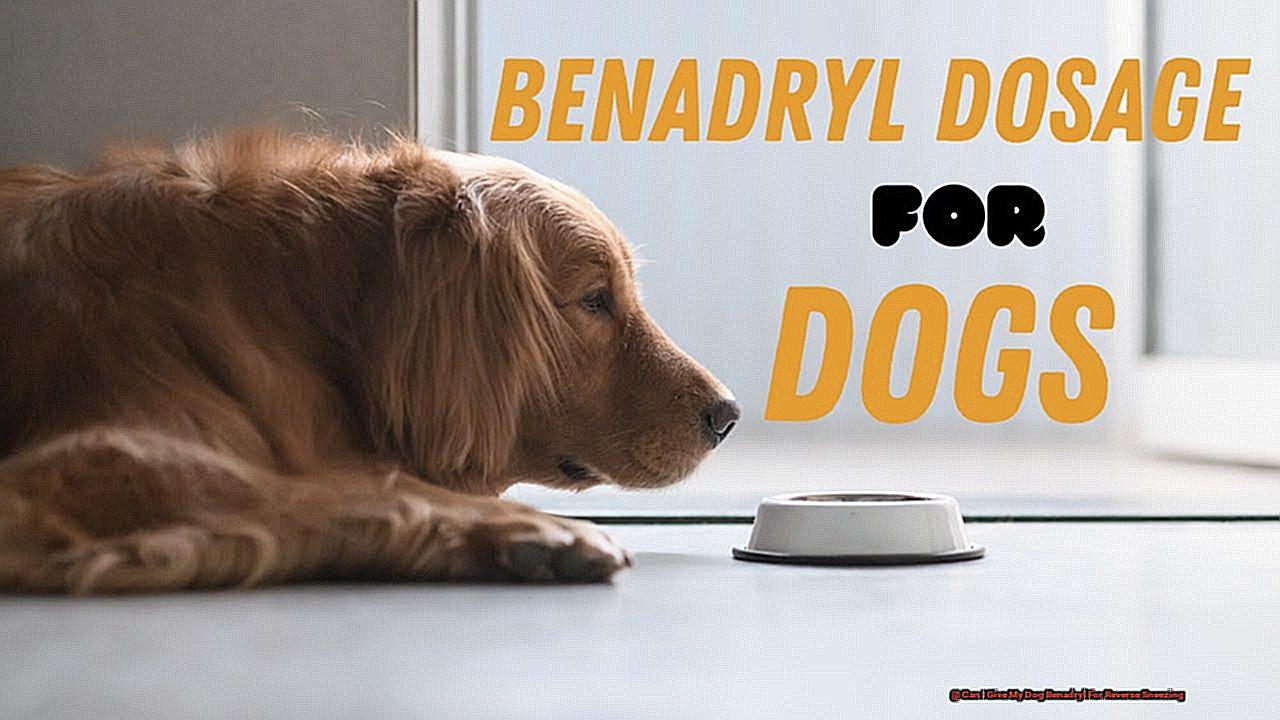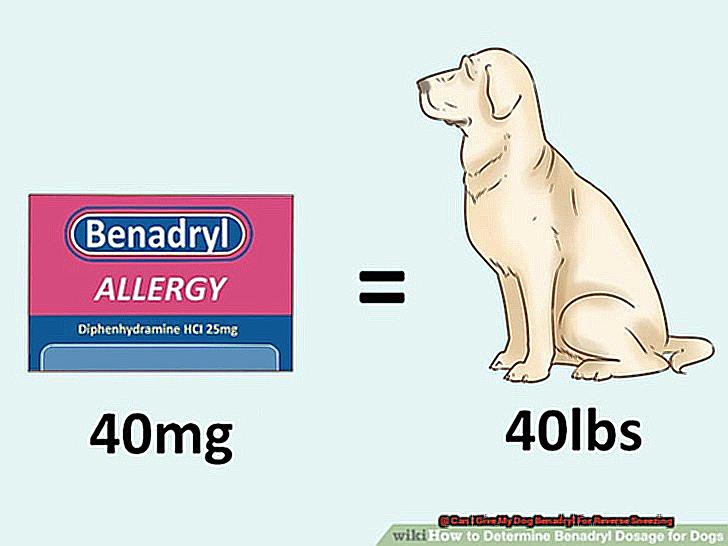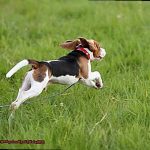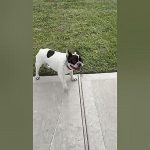Can I Give My Dog Benadryl For Reverse Sneezing?
Picture this: you’re relaxing on the couch with your pup snuggled up next to you, when suddenly they start making strange noises.
It’s not quite a sneeze, but more like a series of rapid inhalations through their nose. What in the world is going on?
Don’t panic – your dog is most likely experiencing reverse sneezing. While it may sound alarming, it’s actually a common issue that can easily be treated with Benadryl.
So, grab a cup of coffee (or tea, if that’s more your jam) and let’s dive into this topic together.
Can I Give My Dog Benadryl For Reverse Sneezing?
Contents
- 1 Can I Give My Dog Benadryl For Reverse Sneezing?
- 2 Causes of Reverse Sneezing in Dogs
- 3 Can Benadryl Help with Reverse Sneezing?
- 4 Consult with Your Veterinarian Before Giving Benadryl to Your Dog
- 5 Alternative Treatments for Reverse Sneezing in Dogs
- 6 Addressing the Underlying Cause of Reverse Sneezing
- 7 Potential Side Effects of Benadryl for Dogs
- 8 Conclusion
If you’re a French Bulldog owner, you may have experienced your furry friend having episodes of reverse sneezing. It can be quite alarming to see your dog making honking or snorting sounds while rapidly inhaling through their nose. While reverse sneezing is usually harmless and resolves on its own, some pet owners may wonder if they can give their dogs Benadryl for relief. As a French Bulldog owner myself, I understand the concern and have done some research to provide you with the answers.
What is Benadryl?
Benadryl is a brand name for the drug diphenhydramine, which is an antihistamine commonly used to treat allergies in humans. It can also be used to alleviate symptoms of motion sickness, insomnia, and anxiety. However, the use of Benadryl for dogs is a controversial topic, especially when it comes to treating reverse sneezing.
Benefits and Risks of Giving Benadryl for Reverse Sneezing
According to veterinarians, Benadryl can help reduce inflammation and irritation in the nasal passages, which may provide relief for dogs experiencing reverse sneezing. It can also help alleviate any allergy symptoms that may be contributing to the episodes. However, there are also potential risks associated with giving Benadryl to dogs. The most common side effects include drowsiness, dry mouth, and urinary retention. In some cases, dogs may also experience paradoxical reactions such as hyperexcitability or agitation.
Why Consult with a Veterinarian?
While Benadryl may seem like a quick fix for your dog’s reverse sneezing, it is crucial to consult with your veterinarian before giving them any medication. Your vet can assess your dog’s overall health and provide a proper dosage based on their weight and condition. They can also advise you on any potential risks or interactions to be aware of. Giving your dog Benadryl without consulting a veterinarian can be dangerous, as dogs may have adverse reactions or allergies to this medication.
Causes of Reverse Sneezing in Dogs
As a proud French Bulldog owner, you know that these lovable and unique dogs often come with their quirks and behaviors. But have you ever heard your Frenchie make a strange snorting or snuffling sound while breathing? This may be a sign of reverse sneezing, a common occurrence in dogs that can be concerning for pet owners.
In this section, we will delve into the potential causes of reverse sneezing in dogs and why it is essential to seek veterinary advice if it becomes frequent or prolonged.
What is Reverse Sneezing?
Reverse sneezing is a rapid and forceful inhalation of air through the nose, accompanied by snorting or snuffling sounds. It is often described as a dog trying to inhale a sneeze. This behavior can last anywhere from a few seconds to a few minutes and may happen multiple times a day.
Causes of Reverse Sneezing in Dogs
The exact cause of reverse sneezing in dogs is still not fully understood, but there are several factors that may contribute to its occurrence. These include:
Irritation or inflammation in the nasal or pharyngeal area: This can be due to allergies, foreign objects stuck in the nose, or even respiratory infections.
- Excitement or agitation: Dogs may experience reverse sneezing when they are overly excited or agitated, such as meeting new people or animals, playing, or eating too quickly.
- Breed predisposition: Certain breeds, including French Bulldogs, are more prone to reverse sneezing due to their shorter noses and elongated soft palates. This can cause difficulty breathing and lead to reverse sneezing episodes.
- Underlying medical conditions: Nasal tumors, polyps, or collapsing trachea can also cause reverse sneezing in dogs. It is crucial to rule out these conditions with a thorough examination from a veterinarian.
- Protective reflex or clearing of nasal passage: Some experts suggest that reverse sneezing may be a way for dogs to clear their nasal passages or get rid of irritation. It may also be a reflexive response to protect the airway from foreign objects. However, more research is needed to fully understand the purpose of this behavior.

Can Benadryl Help with Reverse Sneezing?
While it is usually harmless and does not require medical treatment, some may wonder if giving their dog Benadryl can help with this condition. As an expert on reverse sneezing in dogs, I will explore this question and provide insights on why Benadryl may not be the best solution for your Frenchie.
What is Reverse Sneezing?
Reverse sneezing is a common occurrence in dogs, especially in breeds with short snouts such as French Bulldogs. It is a condition where the dog inhales suddenly and repeatedly through their nose, making a loud snorting or honking sound. This behavior can be triggered by various factors such as excitement, irritation, or a protective reflex. In most cases, it lasts for less than a minute and does not cause any harm to the dog.
Why Benadryl May Not Be Effective
Benadryl is an over-the-counter antihistamine commonly used to treat allergies in humans. It works by blocking the effects of histamine, a chemical released during an allergic reaction. This makes it effective in relieving symptoms such as sneezing, itching, and watery eyes. However, reverse sneezing is not caused by allergies, so giving a dog Benadryl may not necessarily help with this condition.
Harmful Side Effects of Benadryl
One of the main concerns with giving a dog Benadryl is the potential side effects. These can include drowsiness, dry mouth, and gastrointestinal upset. In some cases, it can also cause an increase in heart rate and blood pressure. French Bulldogs are already prone to breathing difficulties due to their short snouts, so adding medication that can potentially cause respiratory distress may be harmful to their health.
Consult with Your Veterinarian Before Giving Benadryl to Your Dog
While this popular antihistamine may seem like a quick and easy solution, it is crucial to consult with your veterinarian before administering any medication to your dog.
Here are some reasons why seeking professional advice is essential when considering using Benadryl for reverse sneezing in French Bulldogs:
Every dog is unique, and so are their health needs.
Just like humans, dogs have individual needs and health conditions that may affect how they react to certain medications. French Bulldogs, in particular, have a distinct body structure and breed characteristics that may make them more prone to certain health issues. By consulting with your veterinarian, you can ensure that your dog’s specific needs and potential risks are taken into consideration before giving them any medication.
Dosage matters when it comes to medications.
Giving your dog the wrong dosage of Benadryl can have adverse effects and may even worsen their condition. This is especially true for small breeds like French Bulldogs, who may require a different dosage than larger dogs. Your veterinarian will be able to provide you with the correct dosage based on your dog’s weight and other factors, ensuring their safety and well-being.
Drug interactions can be harmful.
If your dog is already taking other medications, it is crucial to consult with your veterinarian before adding Benadryl to their treatment plan. Some drugs may interact with each other, causing adverse effects or reducing the effectiveness of either medication. Your veterinarian can advise you on the best course of action and prevent any potential drug interactions.
Alternative treatments may be more effective.
While Benadryl may be a popular choice for treating reverse sneezing in dogs, it may not be the most effective option for your French Bulldog. Consulting with your veterinarian can help you explore alternative treatments or strategies that may be more suitable for your pet’s needs. Your veterinarian may also be able to identify any underlying health issues that may be causing the reverse sneezing and address them accordingly.
Alternative Treatments for Reverse Sneezing in Dogs
While it may sound alarming, reverse sneezing is usually harmless and does not require immediate medical attention. However, as a pet owner, you may want to find ways to help ease your furry friend’s discomfort. One option that may come to mind is giving them Benadryl, an over-the-counter antihistamine medication commonly used to treat allergies in humans. But before you reach for that bottle of Benadryl, there are some important things you should know.
First and foremost, always consult with your veterinarian before giving your dog any medication. Every dog is unique and may have different health needs, and giving the wrong dosage can have adverse effects on their health. Your veterinarian will be able to determine the appropriate dosage for your dog’s size and weight.
Additionally, it is crucial to consider any pre-existing conditions or medications that your dog may be taking. Dogs with certain health issues such as heart disease or liver problems may not be able to safely take Benadryl. It is also important to inform your veterinarian about any other medications your dog is on as Benadryl can interact with other drugs.
While Benadryl may seem like a quick and easy solution, it is not always the best option for treating reverse sneezing in dogs. There are also alternative treatments that you can try that may be more effective for your pet’s specific needs. For example, massaging your dog’s throat in a downward motion can help relax their airway and stop the reverse sneezing episode. You can also try using natural remedies like herbs or essential oils, such as ginger or chamomile, which have anti-inflammatory properties that can help soothe your dog’s airways.
Addressing the Underlying Cause of Reverse Sneezing
If you’re a French Bulldog owner, you may have experienced your furry friend suddenly gasping for air or making snorting noises that sound like they’re choking. This phenomenon is known as reverse sneezing and is quite common in dogs, especially those with short snouts like Frenchies. While it may seem concerning, reverse sneezing is usually harmless and can be triggered by various factors. However, as a responsible pet owner, it’s essential to identify and address the underlying cause of this behavior for your dog’s overall health and well-being.
What is Reverse Sneezing?
Reverse sneezing is a series of rapid, involuntary inhalations that sound like your dog is gasping for air or choking. It can last anywhere from a few seconds to a minute and often ends with your dog swallowing or licking their nose. While it may look and sound alarming, reverse sneezing is typically harmless and does not require immediate medical attention.
Common Causes of Reverse Sneezing in French Bulldogs
There are several potential causes of reverse sneezing in dogs, including allergies, respiratory infections, foreign objects lodged in the nasal passages, excitement or exercise, and more. In French Bulldogs specifically, their short snouts and elongated soft palate can make them more prone to reverse sneezing. It’s essential to pay attention to the frequency and triggers of your dog’s reverse sneezing to determine the underlying cause.
The Importance of Addressing the Root Cause
While reverse sneezing may be harmless most of the time, it can also be a symptom of more serious underlying health issues. For example, if your dog experiences frequent or prolonged episodes of reverse sneezing, it could be a sign of nasal tumors or dental problems. In such cases, seeking professional help from your veterinarian is crucial.
Identifying and addressing the root cause of your dog’s reverse sneezing is important for their overall health and well-being. It can also help alleviate any discomfort or irritation they may be experiencing. Giving Benadryl or other medications without knowing the underlying cause can provide temporary relief, but it’s not a long-term solution.
Potential Side Effects of Benadryl for Dogs
Before you reach for that bottle, it’s crucial to understand the potential side effects that come with giving this medication to your furry friend. While Benadryl is generally considered safe for dogs when administered correctly, it is not without its risks. Here’s what every French Bulldog owner should know about the potential side effects of Benadryl.
Sedation and Decreased Alertness
One of the main concerns with giving Benadryl to dogs is its sedative effect. Just like in humans, Benadryl can cause drowsiness and lethargy in dogs. This means your French Bulldog may be less active, less alert, and more sleepy than usual. In some cases, this sedative effect can also affect your dog’s coordination and balance, making them more prone to accidents or injuries.
Dry Mouth
As an antihistamine, Benadryl can reduce the production of saliva in dogs, leading to a dry and uncomfortable mouth. This can be especially problematic for French Bulldogs who are already prone to dental issues. If your dog experiences dry mouth after taking Benadryl, make sure they have access to plenty of fresh water and monitor their oral health closely.
Gastrointestinal Issues
Some dogs may experience gastrointestinal issues such as vomiting and diarrhea after taking Benadryl. This is because the medication can irritate the lining of the stomach and intestines. For French Bulldogs with pre-existing digestive issues, this can be particularly problematic. If your dog has a sensitive stomach, it’s best to consult with your veterinarian before giving them Benadryl.
Allergic Reactions
While rare, some dogs may have allergic reactions to Benadryl. This can manifest as hives, difficulty breathing, or swelling of the face and throat. If your French Bulldog experiences any of these symptoms after taking Benadryl, seek immediate veterinary care.
Harmful Ingredients
In addition to its active ingredients, Benadryl also contains other ingredients that can be harmful to dogs. For example, xylitol, an artificial sweetener found in some Benadryl products, is toxic to dogs and can lead to serious health issues. Always check the ingredients list before giving any medication to your French Bulldog.
Also Read: How Can I Help My Gassy French Bulldog
Conclusion
In conclusion, reverse sneezing is a common occurrence in dogs that can easily be treated with Benadryl. As a fellow French Bulldog owner, I understand the worry and have conducted extensive research to provide you with accurate information.
While Benadryl may seem like a quick solution for your dog’s reverse sneezing, it is crucial to consult with your veterinarian before administering any medication. Each dog has unique health needs, and only a professional can determine the appropriate treatment for them. Giving your dog Benadryl without proper guidance can be dangerous, as they may have allergies or adverse reactions to the medication.
Moreover, it is essential to address the underlying cause of reverse sneezing for your dog’s overall well-being. While Benadryl may provide temporary relief, it does not address the root issue. Your veterinarian can help identify any potential medical conditions or triggers that may be causing your dog’s reverse sneezing.
Additionally, while Benadryl is commonly used for allergies in humans and dogs alike, it is not without its risks. Possible side effects include sedation, dry mouth, gastrointestinal issues, allergic reactions, and harmful ingredients. Always read the label and consult with your veterinarian before giving any medication to your furry friend.
Remember to seek professional advice when unsure about your dog’s health. With proper care and attention from both you and your veterinarian, you can alleviate any discomfort caused by reverse sneezing in your beloved French Bulldog.
In conclusion, while Benadryl may offer temporary relief for reverse sneezing in dogs, it should only be used under the guidance of a veterinarian. Addressing the underlying cause of this issue is crucial for long-term solutions and ensuring your dog’s overall well-being. Always prioritize their health and safety by consulting with a professional before giving them any medication.




